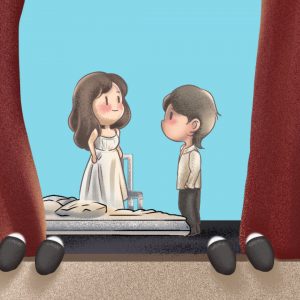Meaning And Differences Between Prose, Drama And Poetry: Whether the subject of a conversation is linked to books or films or even art in museums, the subject of literature is often raised in this digital era of massive film making, song production and art-making. Even though that they are often mixed up due to the fluidity of literary works that has come to stay, it is still very important to know the forms of literature there is.
Literature can be defined as the body of all creative works, written and unwritten with lasting artistic merit. It is almost all-encompassing, as the lines between its categories are getting blurrier with each passing day. However the field sums up all works that are creative and innovative, works that lead narratives that readers and viewers alike find both entertaining and educating. Its major forms are prose, drama and poetry.
Recommended: Differences between presidential and parliamentary system of government
Meaning of a Prose
Prose is derived from the Latin expression; prosa oratio, which means ‘direct speech‘. It is a branch of literature that sports a direct or straightforward structure free from ambiguity. It contains full standard sentences unlike traditional poetry that usually comes in verses and stanzas. There is usually a more direct and natural flow to this form than any other form of literature. Some would consider it as ‘conversational’ in nature because it often feels like facts are being conveyed from the writer to the reader in a speech. It is the clearest form of ‘storytelling’.

Examples of prose are;
Proper fiction.
Works of Journalism/Articles.
Biographies.
Creative Nonfiction.
Alliterative Prose
Also see: How to become a successful business entrepreneur
Meaning of a Poetry
The term ‘poetry’ is derived from the Greek word “poiesis“ , which means ‘making’. It is a form of literature that employs aesthetics and devices such as symbolism and assonance to communicate its meaning efficiently. The earliest poetry can be traced all the way back to hunting folksongs in parts of Africa and ’pyramid’ texts in Egypt where the basic purpose of poetry was communication.

Till today, some poetry types are unique to certain traditions and cultures and would be written in a form familiar to the people that belong to those sections of society. The most outstanding quality of poetry is its ability to draw out emotional responses from its readers. The diction often used in poetry is one that embodies enough metaphors and other figures of speech to give the piece a little more ‘sophisticated’ outlook. This also makes it possible for readers to give such piece several interpretations as the words could hold different meanings to different persons.
There are three major elements of Poetry and they are; rhythm, rhyme and metre.
Poetry is arguably the form of literature with the most sub-forms. It owes its numerous types to its fluidity as it can take various shapes short texts, longer texts with an almost musical sequence. You can find it in songs, in folklore, in myths, lullabies etc. The many types of poetry are classified here into genres which include;
Narrative Poetry
Epic Poetry
Fable
Dramatic Poetry
Speculative Poetry
Also see: Major figures of speech in literature explained
Meaning of a Drama
This form of literature can be a little tricky because a lot of people can’t tell the difference between a prose work and a play. Drama is simply the precise way of creating fiction that can be represented in a play or a mime or even a ballet performance. Here the writer intentionally uses dialogue and conflict to convey a particular story to an audience. Like Prose, it is direct a more intentional, but has a more structural format as it comes in Acts and scenes. Acts and scenes are the headings a playwright employs to guide the readers/viewing audience on exactly what is happening at each stage of the play.

Historically, this field of literature involved only plays live performances of stories in the past, before Shakespearean dramatic era began. This era popularized plays that were left on print without the almost compulsory requirement of live performance. The two basic divisions of Drama are Comedy and Tragedy. However, with the continuous evolution of literature and the various ways it is interpreted, the divisions are no longer as rigid, with the introductions of sub-categories like ‘Trage-comedy’.
The types of drama are;
Opera
Pantomime
Mime
Ballet
Creative drama
Recommended: How to improve your social life
The Differences between Prose, Poetry and Drama
As earlier stated, while the difference between the three forms of Literature are slowly thinning with the advent of reforms and more subcategories. However, they still exist and some of them are;
1. The motive of the piece of literature is very important and stands as one of the differences between the forms of Literature. The motive will be conveyed in the way words are used and the purpose for which they exist. For example, in Prose, words take on a more direct approach that lacks a little of the intention to evoke much emotion from the reading audience, which is very present in poetic and dramatic pieces.
2. The structure of the piece is also very important. Prose is usually written in sentences that form paragraphs. In Drama, the words are conveyed in dialogues between characters. While in Poetry, the words are penned down in lines, verses and stanzas.
3. While Poetry usually pays attention to metres and the rhyme schemes, the focus of the playwright in a drama is on conflict.
4. In terms of expression, poetry takes lead with its cursive use of metaphors, similes and other figures of speech to produce a more rhythmic feel while Prose and Drama tend to be slightly more straightforward without much of the décor.
5. Unlike poetry and drama, prose is a genre of literature that does not require an extended version of delivery to be complete or more effective. Here, extended versions could mean spoken word performance, theatre plays, radio segments and television production. However, for a piece of prose to be represented on television for instance, it must be translated to a script, which is more of a drama with dialogues and conflict.
6. Drama, unlike other forms of literature, takes the most collaborative effort in production, especially in plays. This is as a result of several persons that can be involved in the making of a play. The exception to this difference is seen in instances where prose and poetic works have so many contributors (This is not the norm).
7. Another difference between the three is the issue of length. Prose in many instances carries the most word-length. This is followed closely by Drama with its dialogues and scenes. Poetry stands as the shortest of the three as the diction has a more succinct and gut-punching feel to it. This is however, the case with traditional works of literature. These days, there are sub-categories of fiction and poetry writing that are a lot shorter than the traditional forms. These categories include flash fictive pieces and prose poetic works.
Recommended: Pillars of a democratic government
In conclusion, all three forms of literature have one thing in common – their artistic nature. They are all bodies of art. So whether a piece is a poem or a story or even a play, it remains a literary work as long as it is creative. It is also important to bear in mind that the borders that exist between these literary forms are forever changing and evolving. It is now common practise to merge poetry with prose and some people consider drama as performative poetry. So basically, while it is important to know the difference that exists between the three forms, one shouldn’t let it restrict them.

Edeh Samuel Chukwuemeka, ACMC, is a lawyer and a certified mediator/conciliator in Nigeria. He is also a developer with knowledge in various programming languages. Samuel is determined to leverage his skills in technology, SEO, and legal practice to revolutionize the legal profession worldwide by creating web and mobile applications that simplify legal research. Sam is also passionate about educating and providing valuable information to people.

thank you for that sir
Great work Sir! It helps a lot with my lesson.
perfect answer, thank you.